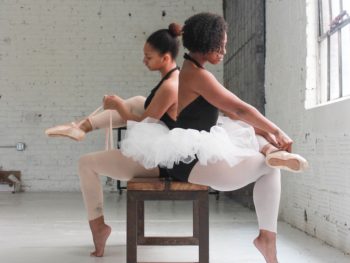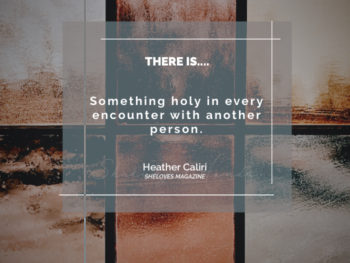![]()
Ever since the election last year, I have wanted to resist. In my introversion and general lack of political activist skill, this has been a mixed bag of efforts. I have attended protests. I have called my congressional representatives. I have signed petitions and read articles. I have prayed with undocumented people. I have also felt anxiety, inertia, and helplessness in spades.
But the other thing I have done—the thing which feels both necessary and wrong and Biblical and cowardly and brave and complicit—is I have tried asking questions of people I know and love who voted for President Trump about why.
Here are all the reasons I feel conflicted about this:
I wonder if engaging in conversations with those who are completely satisfied with their convictions does anything at all.
I want to argue.
I want to correct.
I wonder if listening to those who say, for instance, that Islam is a uniquely dangerous faith is only furthering the problem. (Yes, I pushed back. I am not sure I did it hard enough).
Even typing that last sentence fills me with dismay. Am I making things worse?
I watched a video a few months ago about a Danish politician who met with people who had sent her hate mail. It was both tremendously inspiring and disturbing. I’m part of a group that works towards racial reconciliation, Be the Bridge to Racial Unity, and a lot of the members of color pointed out that this is too much to ask of minorities. Too much to ask that they sit and explain their humanity to other people who question it.
Part of me feels like me having these conversations might save a person from color from having to do so. Part of me thinks I’m whistling in the dark.
I don’t want to debate things that should not be debatable. Sometimes the discussion should end.
I cannot tell, honestly, if my attempts to ask kind, curious questions of people I vociferously disagree with falls into that category.
Still, though, I come back to the verses that we need to be slow to speak and anger and quick to listen….
I’m over at The Mudroom talking about listening to my political opposites. Join me there?














 3 Ways to Reinvigorate Your Prayer Life
3 Ways to Reinvigorate Your Prayer Life
Just a note–respectful disagreement is fine. Posts that tell me I can’t be a Christian because of my political views are not. Respectful disagreement means no personal attacks. You’re welcome to question or critique me on differences of opinion.
I’m also not a fan of conspiracy theories swirling around the Internet, even though people I love deeply are into them. I value YOU but am not interested in providing a forum to spread said theories. I will choose to believe the best of those politicians, Republicans and others with whom I disagree because I’m told to do so in 1 Corinthians 13–we disagree on policy and many other things but I do not believe any human being is a monster. I ask that you do the same when talking about your enemies, as well. And I get to make the rules for this blog because I pay to keep it running. Thanks for stopping by.
Heather, this was so incredibly beautiful. I voted for Trump, have little regret, yet I can absolutely understand why people feel the way they feel. Voting is an incredibly personal decision and the factors that lead one to vote for one or another “should” be complicated (they often are not because people don’t give it enough thought). As someone who did her homework and did it well, I am offended when someone derides my decision. But life would be so much easier if, instead of arguing my position, I simply listened. Thank you for writing such an insightful piece. Peace and love.
I appreciate this–and though we disagree vociferously, I appreciate that you’re trying to listen. It’s hard to be so divided as a country–the only thing I know how to do is to keep asking why while trying to believe the best of the people around me.
As a exercise in listening, I’m curious what your main reason for voting for Trump was–was it concern over the Supreme Court? Distrust/dislike of Hilary Clinton? Appreciation for his business experience? Frustration with traditional politicians? Something else? I’ve been trying to ask that of those around me that made the same choice.
You nailed all of it. There was definite distrust and I felt a deep sense that Clinton was incredibly disingenuous. It was a firm belief that we needed for once to put economics over social issues, and it was wanting for anyone but a career politician to take over- although, ironically, I was a huge supporter of Bernie Sanders and would have voted for him because I believed in his message. I will say I’ve been very diligent about calling Trump our when I feel he’s been wrong, and I am not at all a shoe in for Trump 2020. I hope that helps! I will continue to open my ears and listen- and by the way- I would never, ever say a Democrat could not be a Christian. I actually believe in terms of social issues, Jesus may very well have sided with Democrats over Republicans, but I kinda think he’d be disappointed in us all to some extent. 🙂
Yeah, I know someone else who initially supported Trump and then ended up voting for Bernie in the primaries. I think post-recession there is a lot of anger at traditional politicians–that def. helped Trump and Bernie.
I appreciate you calling him out when you feel led. I think all of us are better off when we keep in mind politicians are human beings and not saviors whose every policy works. I definitely critiqued Obama on some issues (especially immigration) and made my first critical phone calls to the White House during his tenure.
Praying we continue to both discern the healthiest choices for our country and be convicted when we are wrong.
and yeah, I didn’t think you were saying Democrats weren’t Christians. I deleted an earlier post that started out that way.